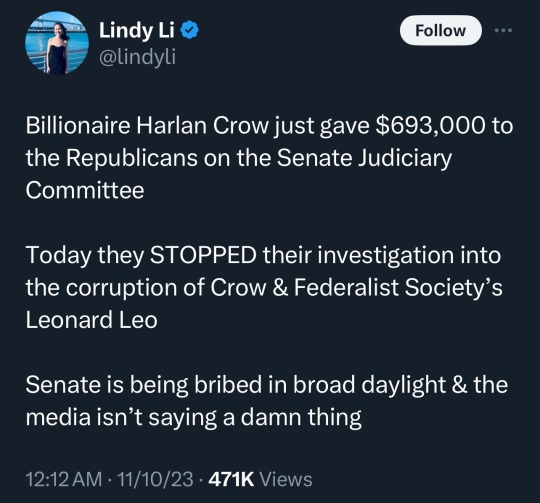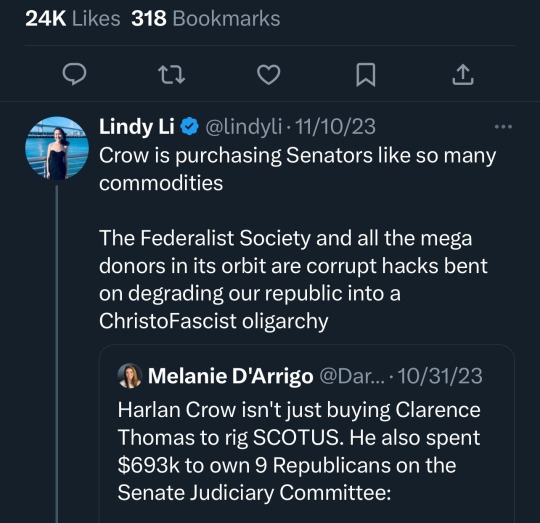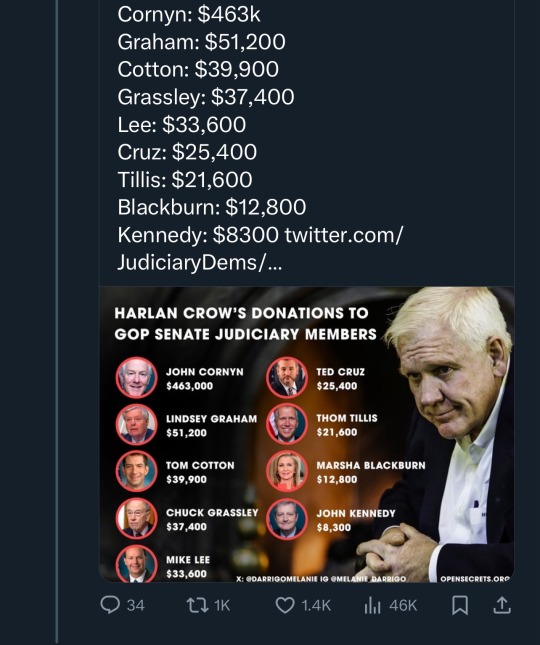Text
By Steven Lubet
In an unprecedented move, the Senate Judiciary Committee has advanced a bill requiring the Supreme Court to adopt a code of conduct and to create a mechanism for investigating alleged violations of the code and other laws.
It is no secret that the Supreme Court Ethics, Recusal and Transparency Act was prompted in part by investigations into several Justices’ deficient financial disclosures, receipt of extravagant gifts, questionable transactions and misuse of staff. The full court has consistently resisted adopting such an ethics code, but certain Justices’ justifications for their questionable conduct only hurt their cause.
Their excuses were all remarkably flimsy, almost beyond belief.
Justice Clarence Thomas began the round of rationalizations when Pro Publica reported that he had enjoyed decades of lavish vacations at the expense of billionaire Republican donor Harlan Crow — including cruises in Indonesia and the Greek Islands on Crow’s superyacht — none of which were included as gifts on Thomas’s financial disclosure forms as required by the Ethics in Government Act.
In a one-paragraph statement, Thomas opaquely claimed that he had sought guidance early in his tenure on the court from unnamed “colleagues and others in the judiciary,” who advised him that “this sort of personal hospitality from close personal friends” was not reportable.
Thomas has never revealed the identities of his alleged ethics advisors, but it is notable that no Justice or Judge has stepped forward to take responsibility for his decidedly lax interpretation of the disclosure rules. Whoever may have mentored Thomas, it is highly unlikely, to put it mildly, that any federal judge in the early 1990s would have understood “this sort of personal hospitality” to cover the omission of 20 years of luxury vacations at a private Adirondacks resort, a Texas ranch and California’s Bohemian Grove, ferried on a private jet (not to mention payment of private school tuition for the Justice’s nephew and the purchase of his mother’s home).
As excuses go, “somebody once told me it was okay” is about a step above “the dog ate my homework,” but it is still better than Thomas’s earlier excuse for not disclosing years of his wife’s employment when Virginia Thomas was paid $686,589 by the conservative Heritage Foundation and Hillsdale College.
Upon amending 20 years of his financial reports, Thomas gave the far-fetched explanation that he had “inadvertently omitted” the information “due to a misunderstanding of the filing instructions.” It takes almost preternatural shamelessness for a Supreme Court Justice — whose job calls for parsing the most complex legislation — to insist that he misunderstood the plain meaning of “spouse’s employment” for 20 reporting years.
If Thomas’s excuses for nondisclosure were sketchy, at least he didn’t become visibly angry when he was caught. Not so Justice Samuel Alito, who made an irate preemptive strike via the Wall Street Journal editorial page when he learned that Pro Publica was about to publicize his own nondisclosures.
The Pro Publica reporters contacted Alito for comment before going live with their article about an Alaska vacation financed by prominent Republican donors. Rather than answer their questions, however, Alito took advantage of his contacts at the Wall Street Journal to get a jump on the story. He published his response several hours before Pro Publica’s post, in which he called the yet unseen article misleading and false.
There was no disputing the facts. In 2008, Alito enjoyed a three-day, all-expenses junket at a remote Alaska fishing camp owned by a wealthy conservative activist named Robin Arkley II which was apparently arranged by Federalist Society official Leonard Leo. Another guest was the billionaire Paul Singer, who flew the Justice to Alaska on his private jet. No details about the trip were listed as gifts on Alito’s disclosure forms.
Unlike Thomas, Alito claimed no preexisting friendships with his benefactors, which did not stop him from playing the “personal hospitality” card. Although the statutory disclosure exception clearly applies only to “food, lodging, or entertainment,” and not to transportation, Alito defended his nondisclosure by cobbling together several unrelated statutes in a tortured attempt to show that private jet flights constitute “hospitality facilities.”
The Justice seemed to argue that the trip had no value because he sat in “what would have otherwise been an unoccupied seat,” imposing no “extra cost” for Singer. One might expect an avowed textualist to pay more attention to the statutory definition of “gift,” which includes, for example, “free attendance at an event,” which also costs nothing to the host.
The most recent revelations involve Justice Sonia Sotomayor’s use of court staff to bolster her book sales at speaking engagements. That would have violated the lower federal courts’ Code of Conduct for United States Judges, which prohibits the substantial use of “chambers, resources or staff” to engage in otherwise permitted financial activities — if the Supreme Court had ever adopted its own version of the code.
Sotomayor’s excuse was that her “chambers staff” was only recommending “the number of books based on the size of the audience so as not to disappoint attendees who may anticipate books being available at an event.” In other words, the Justice admitted assigning a judicial assistant to keep track of book purchases relative to audience sizes, in order to maximize her potential sales.
The three Justices’ hollow rationalizations display a patronizing expectation that the public will ultimately buy whatever they say, no matter how implausible.
But to paraphrase the late Justice Robert Jackson: Supreme Court Justices do not get the last word because they are infallible; they only believe themselves infallible because they get the last word. When it comes to judicial ethics, that has to change.
#us politics#news#op eds#the hill#Steven Lubet#us supreme court#scotus#ethics rules#Supreme Court Ethics Recusal and Transparency Act#Senate Judiciary Committee#Ethics in Government Act#harlan crow#pro publica#justice clarence thomas#justice samuel alito#Robin Arkley II#Leonard Leo#Paul Singer#financial disclosure reports#Justice Sonia Sotomayor#Code of Conduct for United States Judges#2023
76 notes
·
View notes
Text
by Justin Elliott, Joshua Kaplan and Alex Mierjeski
ProPublica
July 12, 2023
Senate Judiciary Committee Democrats have sent letters to two wealthy businessmen and a major political activist requesting more information about undisclosed gifts to Supreme Court justices. The letters, sent Tuesday by Sen. Sheldon Whitehouse, D-R.I., and Sen. Dick Durbin, D-Ill., the committee chair, seek more details about an undisclosed 2008 luxury fishing vacation Justice Samuel Alito took that was reported last month by ProPublica. The letters went to three people: hedge fund billionaire Paul Singer; mortgage company owner Robin Arkley II; and Leonard Leo, a longtime leader at the Federalist Society, the powerful conservative legal group. All three men played a role in paying for or organizing Alito’s 2008 vacation, but the letters go beyond that trip. The senators requested Leo and the businessmen provide a full accounting of all transportation, lodging and gifts worth more than $415 they’ve ever provided to any Supreme Court justice. “To date, Chief Justice Roberts has barely acknowledged, much less investigated or sought to fix, the ethics crises swirling around our highest Court,” Durbin and Whitehouse said in a joint statement. “If the Court won’t investigate or act, Congress must.” The senators’ committee has announced it plans to vote on July 20 on a bill that would tighten Supreme Court ethics rules.
Read more.
#u.s. supreme court#senate judiciary committee#leonard leo#robin arkley II#paul singer#samuel alito#judicial ethics
5 notes
·
View notes
Text
Joan McCarter at Daily Kos:
The Senate Judiciary Committee has given the right-wing benefactors of Supreme Court Justices Clarence Thomas and Samuel Alito plenty of opportunity to tell their side of the story when it comes to the lavish gifts and trips the backers have supplied. But those wealthy benefactors—Leonard Leo, Harlan Crow, and Robin Arkley II—have refused to cooperate. So they’re getting subpoenaed. Sens. Dick Durbin, chair of the Senate Judiciary Committee, and Sheldon Whitehouse, chair of the Senate Judiciary Subcommittee on Federal Courts, Oversight, Agency Action, and Federal Rights, announced their intent to subpoena the three Monday, writing, “Due to Crow, Leo, and Arkley’s intransigence, the Committee is now forced to seek compulsory process to obtain the information they hold.” The vote will be held as soon as Nov. 9, the leaders told The Washington Post.
Durbin told Politico he believes that Judiciary Committee subpoenas could reveal more information about the connections between these Republican megadonors and the conservative justices. “I’m sorry to say, I think there's a lot more there,” he said. His isn’t the only committee delving into the finances and ethics of the justices. The Senate Finance Committee has an ongoing investigation into the largesse Thomas has received from multiple donors—or “friends,” as they insist on calling themselves. Durbin is confident he will have the votes of all of the Democrats on the panel to approve the subpoenas now that newly appointed California Sen. Laphonza Butler is on the panel. The long illness and death of Sen. Dianne Feinstein meant that the committee was in a stalemate with Republicans for much of this year. Democrats have the majority again, and they plan to use it.
Leonard Leo, Harlan Crow, and Robin Arkley II will finally be subpoenaed to appear before the Senate Judiciary Committee led by Sen. Dick Durbin (D-IL).
#SCOTUS#Ethics#Courts#Leonard Leo#Harlan Crow#Robin Arkley II#Dick Durbin#Senate Judiciary Committee#US Senate#Sheldon Whitehouse#Samuel Alito#Clarence Thomas#SCOTUS Ethics Crisis
7 notes
·
View notes
Text




The Senate Judiciary Committee on Thursday walked back a planned vote to subpoena two megadonors connected to Supreme Court Justices Clarence Thomas and Samuel Alito. The reason? Republicans threw a fit.
Democrats on the Judiciary Committee finally took the first step last week to address the high court’s ethics crisis and announced they would seek to subpoena Republican billionaire megadonor Harlan Crow and ultraconservative activist Leonard Leo. Both men feature prominently in the ethics scandal for their relationships with Thomas and Alito. The committee said it would also seek to subpoena wealthy GOP donor Robin Arkley II.
But Chair Dick Durbin appeared to put that all on hold on Thursday, when he abruptly ended a committee meeting after outraged Republicans threatened to retaliate if Crow and Leo were subpoenaed.
(continue reading)
#politics#republicans#clarence thomas#harlan crow#scotus#the federalist society#leonard leo#crony capitalism#john roberts court#roberts court#john roberts
156 notes
·
View notes
Quote
The justice’s stay was provided free of charge by another major donor to the conservative legal movement: Robin Arkley II, the owner of a mortgage company then based in California. Arkley had recently acquired the fishing lodge, which catered to affluent tourists seeking a luxury experience in the Alaskan wilderness. A planning document prepared by lodge staff describes Alito as a guest of Arkley. Another guest on the trip told ProPublica the trip was a gift from Arkley, and two lodge employees said they were told that Alito wasn’t paying.
Alito Took Unreported Luxury Trip With GOP Donor Paul Singer
4 notes
·
View notes
Text
0 notes
Text
Frank Thorp V and Rebecca Shabad at NBC News:
WASHINGTON — The Senate Judiciary Committee on Thursday voted to approve subpoenas for conservative activist Leonard Leo and GOP megadonor Harlan Crow in its Supreme Court ethics probe. The subpoenas were approved by 11 Democratic senators; no other senators voted. Republican members walked out of the committee room during the vote once it was clear that Chairman Dick Durbin, D-Ill., wouldn't allow votes on any GOP amendments. Ahead of the meeting, Durbin told reporters that Republicans had filed 177 amendments, which would have taken hours to go through. “It will be a shitshow,” Sen. Lindsey Graham, R-S.C., the committee’s top Republican, told NBC News on Wednesday. “If they bring it up, we got tons of amendments.” Durbin said that the GOP’s effort was intended to elongate the meeting and put Democrats in a tough spot on controversial votes. Before the vote on the subpoenas, the meeting devolved into partisan bickering after Democrats tried to block Republicans from debating a nominee the panel was considering.
The meeting became tense after Durbin refused to let Republicans speak about a judicial nominee under consideration, saying that GOP members already had two opportunities to speak about the individual. “Congratulations on destroying the United States Senate Judiciary Committee,” Sen. John Cornyn, R-Texas, said to Durbin after Republicans then refused to vote on the subpoenas. [...] ProPublica reported in April that Justice Clarence Thomas accepted trips funded by Crow, a billionaire donor. In June, the outlet reported that Justice Samuel Alito took an undisclosed fishing trip to Alaska in 2008 with GOP donor Robin Arkley II that was coordinated by Leo. Earlier this month, the Supreme Court adopted what it described as a new code of conduct following allegations of ethical lapses. Its effect is likely to be limited because the justices would enforce it themselves.
Senate Judiciary Committee approved subpoenas for Harlan Crow and Leonard Leo. 👍🏼
#Senate Judiciary Committee#US Senate#Dick Durbin#John Cornyn#Harlan Crow#Leonard Leo#SCOTUS#Ethics#SCOTUS Ethics Crisis#Subpoenas
138 notes
·
View notes
Text
0 notes